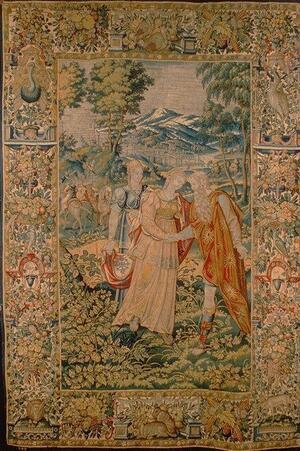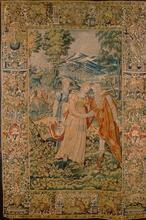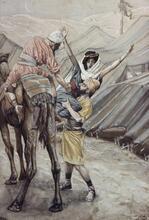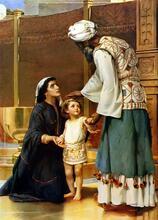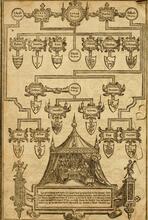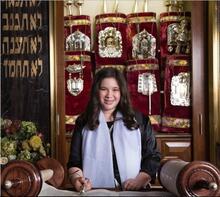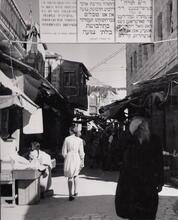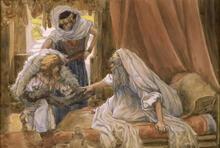Bilhah: Midrash and Aggadah
Bilhah was the maidservant of Rachel and mother of Dan and Naphtali. The rabbis fill in details about her life, her relationship with Jacob, and the confusing incident between Bilhah and Reuben, Jacob’s eldest son. They elevate her to more than just a handmaid, describing her at times as a wife to Jacob and giving the two a close emotional relationship, as well as describing her as a mother figure to Joseph and Benjamin. They provide a variety of perspectives to understand the episode between Reuben and Bilhah, trying to rehabilitate or defend Reuben’s character.
Bilhah in Midrash
There is a rabbinic tradition that counts Bilhah among the six Matriarchs (Ecclesiastes Rabbah 6:4:2). She was the handmaiden of Rachel, to whom she had been given by Rachel’s father Laban when she married Jacob. According to one tradition, Bilhah was the niece of Deborah, Rebekah’s wet nurse. Her father named her Bilhah because as an infant she tended to be alarmed (le-hibahel) and could not nurse properly (A type of non-halakhic literary activitiy of the Rabbis for interpreting non-legal material according to special principles of interpretation (hermeneutical rules).Midrash Statements that are not Scripturally dependent and that pertain to ethics, traditions and actions of the Rabbis; the non-legal (non-halakhic) material of the Talmud.Aggadah, ed. Buber, Gen. 30:2). Another tradition, however, maintains that Bilhah was actually Rachel’s paternal half sister: she was the daughter of Laban from his “marriage” to one of his concubines and is therefore called a “handmaiden” (Gen. Rabbati, Vayeze, p. 119).
When Rachel realized that she was barren, she emulated Sarah and gave Bilhah to Jacob, saying: “Just as this one was built by her rival wife, so, too, shall I be built by my rival wife” (Gen. Rabbah 71:30). Jacob loved Rachel more than Leah and he even loved Rachel’s handmaiden Bilhah more than Zilpah, Leah’s handmaiden (Gen. Rabbati, Vayeze, p. 120).
Rachel and Bilhah were suitable for Jacob and were designated for him from the outset, while Leah and Zilpah were intended for Esau. Since, however, Esau cast off all moral bounds, Jacob was given all four women (Shir ha-Shirim Zuta 1:15). Another tradition tells that Bilhah was Leah’s handmaiden and Zilpah was Rachel’s; when Laban deceived Jacob and gave him Leah instead of Rachel, he also exchanged the two handmaidens, in order to confuse his prospective son-in-law. (Midrash Aggadah, ed. Buber, Gen. 29:24).
Bilhah bore Jacob two sons, Dan and Naphtali, the first by her own merit and the second by the merit of Rachel (Gen. Rabbati, Vayeze, p. 121). Bilhah’s pregnancy was noticeable and therefore the Torah she-bi-khetav: Lit. "the written Torah." The Bible; the Pentateuch; Tanakh (the Pentateuch, Prophets and Hagiographia)Torah says of her “she conceived [“va-tahar]” (Gen. 30:5), since she looked like a mountain (har) while pregnant (Midrash Aggadah, ed. Buber, Gen. 29:24). Bilhah married Jacob lovingly and did not refuse to bear children for her husband (as Zilpah had done); therefore Naphtali’s sons are credited to her and the enumeration of her children in the list of Jacob’s descendants in Gen. 46:25 uses the wording “persons in all,” which is also used in reference to the children of Rachel and Leah, the full wives (Gen. Rabbati, Vayigash, p. 223).
After Rachel’s death Bilhah took her place, raising Joseph and Benjamin as if they were her own children (Gen. Rabbah 84:11). The newborn Benjamin needed a wet nurse and Bilhah’s breasts miraculously filled with milk, even though she had ceased giving birth several years previously, and she was thus able to nurse the infant. It is said that Joseph treated Bilhah’s sons as brothers, and not as the sons of a handmaiden (Tanhuma, Vayeshev 7). Bilhah also took Rachel’s place in Jacob’s tent (Gen. Rabbati, Vayishlah, pp. 156–157). She was close to him until his dying day and served him when he fell ill (Pesikta Rabbati, Ba-Yom ha-Shemini 3). Bilhah was the one who informed Joseph that his father was ill. His brothers also knew of this special affinity between Joseph and Bilhah, and after Jacob’s death they asked her to go and speak with Joseph on their behalf, since they feared his vengeance for their base treatment of him (Tanhuma [ed. Buber], Exod. 2).
The Episode of Reuben and Bilhah
The Bible relates that Reuben lay with Bilhah, his father’s concubine (Gen. 35:22). The Rabbis ruled that this episode is among the verses that are read but without targum, that is, that they should not be interpreted during the public reading of the Torah she-bi-khetav: Lit. "the written Torah." The Bible; the Pentateuch; Tanakh (the Pentateuch, Prophets and Hagiographia)Torah ((Aramaic) A work containing a collection of tanna'itic beraitot, organized into a series of tractates each of which parallels a tractate of the Mishnah.Tosefta Lit. "scroll." Designation of the five scrolls of the Bible (Ruth, Song of Songs, Lamentations, Ecclesiastes, Esther). The Scroll of Esther is read on Purim from a parchment scroll.megillah, 3:35), thus teaching of the Rabbis’ displeasure at this act. As depicted in the (pre-rabbinic) Apocrypha, following Reuben’s action Jacob withdrew from Bilhah and had no further sexual relations with her (Testament of Reuben 3:15; Jubilees 33:9). Various rabbinic midrashim, however, report Reuben’s great remorse: he fasted his entire life and ate no bread. His sin was forgiven during the time of Moses, who blessed Reuben in Deut. 33:6: “May Reuben live and not die.” By the force of this blessing, all knew that the Holy One, blessed be He, had pardoned him (Sifrei on Deuteronomy, 31). Another tradition maintains that the goat in the offering of the tribe of Reuben at the dedication of the Tabernacle (Num. 7:34) was meant to atone for the episode with Bilhah. Reuben’s sin was pardoned, among other reasons, because of his rescue of Joseph from the murderous plan of his other brothers (Num. Rabbah 13:18).
Another position expressed by the Rabbis is that Reuben did not sin and did not have relations with Bilhah. Reuben saw that Jacob had moved Bilhah to Rachel’s tent after the latter’s death. Infuriated by this act, Reuben sought to restore his mother’s honor. He exclaimed: “As long as Rachel was alive, her bed was next to that of Jacob. Is it not enough that my mother was jealous of her sister in her lifetime, even after her death must she be jealous of her handmaiden?” He therefore went and upset his father’s couch, removed Bilhah’s bed and replaced it with that of his mother Leah. Jacob reproached him for this act before his death, as we read in Gen. 49:4: “For when you mounted your father’s bed, you brought disgrace—my couch you mounted!” (Sifrei on Deuteronomy, 347; Gen. Rabbah 99, ed. Theodor and Albeck [MS. Vatican]; BT SabbathShabbat 55b).

